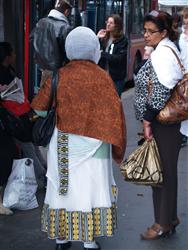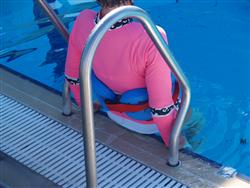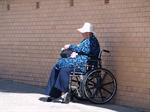
Study, Learn and Work in Geriatric Care or Counselling.
Counselling Older People and Care course.
- Study by Distance Learning.
- Understand more about the care needs of older people and also their mental health needs.
- Learn more about counselling techniques and support.
The psychology of an ageing person is somewhat different to that of a younger person; and yet it is normally younger people who are caring for the elderly. This course can help you better understand the mind of the elderly; and in doing so, vastly improve your capacity to work with and care for the elderly.
Ageing is the process of growing old. It is a gradual biological impairment of usual functioning. These changes have a direct impact on the ability of organs, such as the heart, kidney and lungs and biological systems such as the reproductive and digestive systems, which affect the organism as a whole.
As a person gets older things change in their life: everything from lifestyle to health and their capacity to do things, through to those activities which they choose to pursue.
This course is suitable for anyone working and living with older people who would like to support them more efficiently and effectively. For example -
- Carers
- Support Workers
- Family members
- Volunteer workers
- Health Care staff
- Counsellors
- Trainee Counsellors
- Reminiscence workers
- And anyone working or living with an older person.
Course Structure and Content
There are nine lessons in this module as follows:
1. Understanding Ageing
- Gerontology
- What do we mean by Ageing?
- Population Ageing
- The Effects of the Ageing Population
- Theories of Human Development
- Erikson’s Theory of Development
- Levinson
- Theories of Retirement
- Disengagement Theory
- Activity Theory
 Atchley’s Model of Retirement
Atchley’s Model of Retirement
2. Lifestyle Changes
- Relationships
- Relationships with Children
- Relationships with Partners (Husband/Wife)
- Relationships with Grandchildren
- Friendships
- Sexuality and Older People
- Cognitive Changes
- Intelligence
- Depression
- Determining Type of Depression
- Unipolar Disorder
- Bipolar Disorder
- Causes of Depression
- Risk factors for Depression
- Men and Depression
- Depression in Older People, Symptoms
3. Deterioration of Health
4. Support Services
- Preventative Services
- Occupational Therapists
- Physiotherapists
- Complimentary Practitioners
- Counselling Professionals
- Other Support Services (e.g. Meals on Wheels, Funeral Services)
5. Enablement Techniques
-
Common Risks for Elderly: Risk of Falling, Vision, Hearing, Nutrition, Sexuality
-
Techniques to maintain Quality of Life
-

Driving a car, banking, shopping, house cleaning
-
Gardening
-
Socialising
-
Pets
-
Exercise
-
Sport
6. Grief and Loss Counselling
-
What is grief
-
Psychological aspects of Long Term Grief
-
Family, Work, Financial, Loneliness
-
Morality after bereavement
-
Counsellors Response and Intervention
-
Practical Intervention
-
Depression
7. Debilitating and Terminal Illness
-
Dementia, Kinds of Dementia (Alzheimer's Disease, Vascular Dementia)
-
Strategies for Counselling a client with dementia
-
Communication
-
Daily Activities
-
Sleeping Difficulties
-
Hallucinations and Delusions
-

Wandering
-
Depression
-
Terminal Illness: Patients Response
-
Anxiety
-
Depression
-
Guilt & Anger
-
Defence Mechanisms
-
Preparing for Approaching Death
-
Practical Preparations
-
Emotional Responses
-
Responses of Friends and Family
8. Losing a Loved One
- Importance of Loss
- Assessment, Role of the Deceased, Death of a Child
- Stigmatised Death
- Co-Morbidity
- Counselling Strategies
- Bibliotherapy
- Use of Rituals
- Bereavement Support Groups
- Special Therapeutic Situations
- Traumatic, Sudden, and Stigmatised Loss
 Ongoing Support
Ongoing Support- Social Stigmas of Suicide
9. Ethics and Intervention
-
Barriers to Aged Care Counselling
-
Addressing the Client’s Needs
-
Common Legal and Ethical Issues with Aged Care
-
Decision Making Capacity
-
Competence
-
Informed Consent
-
Confidentiality
-
Aims
- Discuss theories of ageing, and to develop an understanding of the different stages of human development.
- Describe the psychological impact of changes which occur as a person reaches old age
- Explain the effect of physical health problems on older people.
- Describe the nature and scope of support services, including counselling, for the elderly.
- Describe a range of solutions that can enable an elderly person to adapt to changed circumstances in order to continue performing tasks or pursuing interests that are becoming increasingly difficult for them.
- Explain how a variety of counselling techniques can be applied to specific Grief and loss situations for counselling elderly persons.
- Develop a strategy for counselling an elderly person who has been diagnosed with a debilitating or terminal illness.
- Develop a strategy for counselling an elderly person who has lost a loved one.
- Determine when and how to intervene in the life of an elderly person
ACS student comments: "[Work marked] promptly and with
comments that show detailed reading of my work. I have been impressed by
the quick turn-around time and the feedback I’ve received. Having the
course structured into 9 lessons has been helpful for me in approaching
the course and fitting it into a busy schedule. The marking is always
very prompt and is providing lots of feedback which assists in knowing
where I may have fallen short in my answers or done very well." Deana Efraemson, Aged Care and Counselling course.
What Happens When We Age?
Ageing has many implications. Amongst other things, it inevitably leads to physical decline. This may be due to –
- Poor diet.
- Lack of exercise.
- Lifestyle.
… rather than illness or as a consequence of the ageing process. As a person ages, they will experience the following –
- Muscle mass decreases.
- Cells decay. The DNA strand in our cells becomes damaged, which ultimately leads to the failure of the cells’ energy production.
- Energy reserves will reduce.
- The immune system will have a reduced capacity to fight against disease.
- The organs and bodily systems, such as hearts and lungs will become less efficient.
Ageing is therefore the result of damage to the cells in our bodies.
However, the speed at which a person ages will be affect by their outlook on life and personal experience and circumstances. It will vary from person to person. However, this is not necessarily a negative experience. As a person loses in some areas, they may gain in others. For example, they may lose some energy, but they may learn the ability to conserve energy. They may learn patience, understanding, wisdom and experience, all of which may improve their lives regardless of any physical changes.
As people age they need increasing levels of help; both physical help and psychological support. To become sensitive to the needs of the aged, involves both an understanding of the process of aging, and an appropriate attitude toward helping the older people.
Aged Care and Counselling is not a job that suits everyone; but it is a job that many people are thrust into -some choose it; some do not.
This course is a big step toward understanding what is involved, ands at the very least knowing what is needed to care for the aged.
Working with the Elderly
There are many different types of jobs that can involve working with elderly people; from health and welfare professions, or geriatric aids to jobs such as food service and maintenance staff in a retirement village.
Geriatric aides work in nursing homes, assisted living situations, and private homes. They are generally employed to provide care and companionship to elderly patients who are unable to look after themselves due to cognitive or physical disabilities. They may help with things such as daily personal care – bathing, feeding, shopping, running errands, attending appointments, administering medication, and possibly housework.
With an ageing population, the opportunities for geriatric aides will expand even further. Aides working in nursing homes may work casually, or be in permanent positions, and may have a fixed or flexible roster. Aides may be required to work evenings, early mornings and weekends. Many aides work in private homes, either employed by the elderly patient, or through an agency. Depending on the situation, this type of work may be flexible, so for someone with children or other responsibilities may find that they can fit in care work around their other commitments.
Geriatric aide work is generally on the lower end of the pay scale, but this can depend on the individual job and employer. The job may have other benefits that make the job more appealing. There is also potential to move into more senior or managerial type roles that may have a higher pay rate.
Geriatric aides may be required to do heavy lifting if their patient has physical disabilities. They may also need to do tasks that some people may find uncomfortable, such as bathing and helping patients to go to the bathroom.
Depending on their disabilities, geriatric patients may be emotionally challenging to work with, for example if they have rude or aggressive behaviours. There is also the emotional aspect that the patient may pass away – the geriatric aide would need to be prepared for this.
How to become a Geriatric Aide
There are generally no formal qualifications required to become a geriatric aide, and you will usually receive training on the job. Saying that, to get a job, your employers are likely to look for some qualities, skills and knowledge to suggest you would be suitable for the job. Gaining work experience by volunteering is a good way to demonstrate that you can successfully do this type of work.
Gaining an understanding of counselling is also looked upon highly. There are courses available that focus specifically on the needs of elderly clients or patients and aged care counselling. It may also help you prepare for your job to understand the ageing process by studying developmental psychology, as well as gaining an understanding of health issues and human biology. As a geriatric aide it is likely that there will be times when you need to deal with grief and loss. Developing counselling skills in this area will help you to support families of your elderly client or patient, your client themselves if they lose friends or loved ones, as well as other carers (and yourself!) when patients are lost. You can find short courses in all these areas.